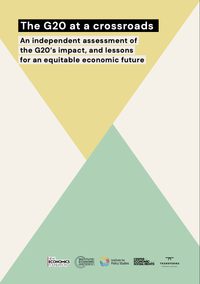The G20 at a crossroads
An independent assessment of the G20’s impact, and lessons for an equitable economic future
10 November 2025
The G20 sits at a crossroads of purpose, legitimacy, and possibility. Since its elevation to a leaders’ forum in 2008, the Group of Twenty (G20) has cemented its purpose as the primary platform for crisis response and macroeconomic coordination. When financial crises threatened to engulf banks, creditors, or systemic markets, the forum mobilised trillions in fiscal stimulus and liquidity. The 2009 London summit serves as the paradigmatic case of the G20’s effective crisis reflex, with $1.1tn pledged for credit and growth, and the creation of the Financial Stability Board to strengthen oversight of global finance.
But assessed against a wider purpose of delivering economic justice its shortfalls become clearer. The G20 has consistently failed to address the systemic inequities driving debt burdens, ecological collapse, and widening social insecurity.
The G20 claims legitimacy through scale. Its members account for around 85% of global GDP, 75% of world trade, and two-thirds of the world’s population. Legitimacy is, however, contested. Most countries remain outside the room and within the G20 the balance of power sits firmly with G7 members, supported by the international financial institutions (IFIs) and embedding the priorities of Global North countries.
Questions of legitimacy also arise from a group self-appointed to address global challenges, even as members often exacerbate them. In 2022 alone, G20 members provided a record $1.4tn in explicit fossil-fuel support.vi When under-pricing of environmental damages is included, total fossil-fuel subsidies reached $7tn – equivalent to 7.1% of global GDP – far exceeding total climate finance commitments.
This report assesses the record of the G20 across five policy domains and applying two lenses. First, it measures the G20’s delivery against its own stated aims of “strong, sustainable, balanced, and inclusive growth”. Second, it applies an economic justice framework, testing outcomes across distributive, procedural, recognition, restorative, capability, and environmental dimensions.
In all cases we find a G20 unable to deliver structural reform as the forum negotiates often-divergent interests and deliver outcomes shaped by systemic asymmetries and dominant norms.
The sequence of four Global South presidencies in 2022 – 25 has shown how priorities can shift, and possibilities can emerge, when agendas are shaped by countries outside the G7. These presidencies have centred the concerns of large Global South economies and helped to expand the idea of what counts as a crisis and for whom. Indonesia prioritised pandemic recovery and energy transition financing, leading to the first Just Energy Transition Partnership (JETP) with a focus on coal phase-down.1,xiv,xv India advanced digital public infrastructure as a development tool, linking it to inclusion in finance and services.2,xvi,xvii Brazil broke new ground by placing the taxation of super-rich individuals on the G20 agenda (and beyond), alongside a push for green industrial policy.3,xviii,xix South Africa has foregrounded care economies and adaptation finance, convening debates on how social reproduction and climate resilience can be integrated into economic governance.4,xx,xxi These efforts reveal how a wider plurality of economic thought and experience can reframe global governance, even if outcomes remain constrained by consensus rules, entrenched Global North power, and the forum’s dependency on national implementation.
The G20 will continue to grapple with questions of purpose and legitimacy, of fragmented interests and uneven implementation. But its possibilities in the next 20 years will also be shaped by a changing world and how it meets these four interlinked questions:
- Can it remain credible in a shifting global power order?
- What happens if economic rivalry gives way to direct confrontation among members?
- Can leaders deliver multilateral commitments amid domestic inequalities and polarisation?
- Will the G20 redefine what constitutes a crisis?
These questions are joined by the growing structural dominance of private capital and wealth in our economies. As the world drifts toward its first trillionaire, the extreme accumulation of wealth in our global economy remains the missing variable in global economic governance across policy domains, and one which the G20 must address.
Recommendations
Nearly two decades of experience point to five principles for action:
- Embed justice and sustainability in crisis coordination. Future G20 responses must integrate equity, debt sustainability, social protection, and ecological thresholds into their design. Justice metrics, such as debt-service ratios, regional vaccine access, reduced wealth concentration, and fiscal space for social investment, should become standard indicators of success. Applying these benchmarks would transform crisis management from reactive stabilisation to proactive, distributive resilience.
- Use soft power to shift norms toward equity. Use the G20’s power to influence narratives to reshape norms. Share priorities, indicators, and reporting cycles with UN bodies such as UNFCCC and the UN Framework Convention on Tax Cooperation (UNTC), thereby reinforcing, upholding and legitimising democratic governance.
- Engage and legitimise coalitions advancing structural change. The G20’s visibility should be used to gain traction for progressive breakthroughs, which often originate outside formal decision-making structures. The Bridgetown Initiative, Jubilee debt campaigns, the UNTC, and the New Development Bank illustrate how coalitions of states and movements can pioneer new norms, policies and institutions.
- Build fairer systems to enforce rules and accountability. Current frameworks remain largely voluntary and whilst fully binding global enforcement raises sovereignty constraints, graduated mechanisms – such as agreed creditor-participation clauses, regional arbitration panels, or collective-action frameworks – can combine feasibility with fairness.
- Broaden the meaning of stability to include human and planetary security. The G20 continues to define crises through threats to financial stability. But the defining risks of this century are social and ecological: climate disruption, precarious work, and widening inequities.
If the G20 can integrate these lessons – expanding its definition of crisis, sharing enforcement responsibility, and aligning with universal justice-based norms – it can move from a forum that prevents the collapse of the financial system to one that fosters human and planetary wellbeing.
Image: Senderistas/shutterstock







